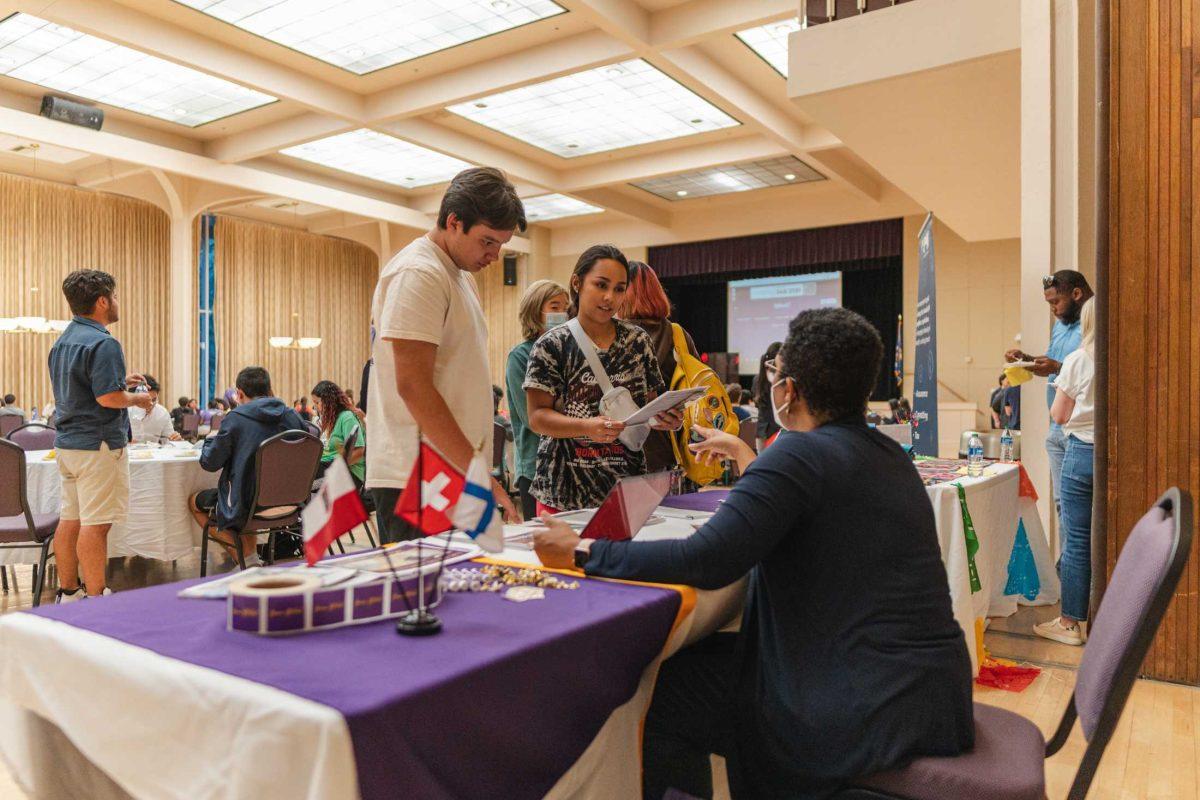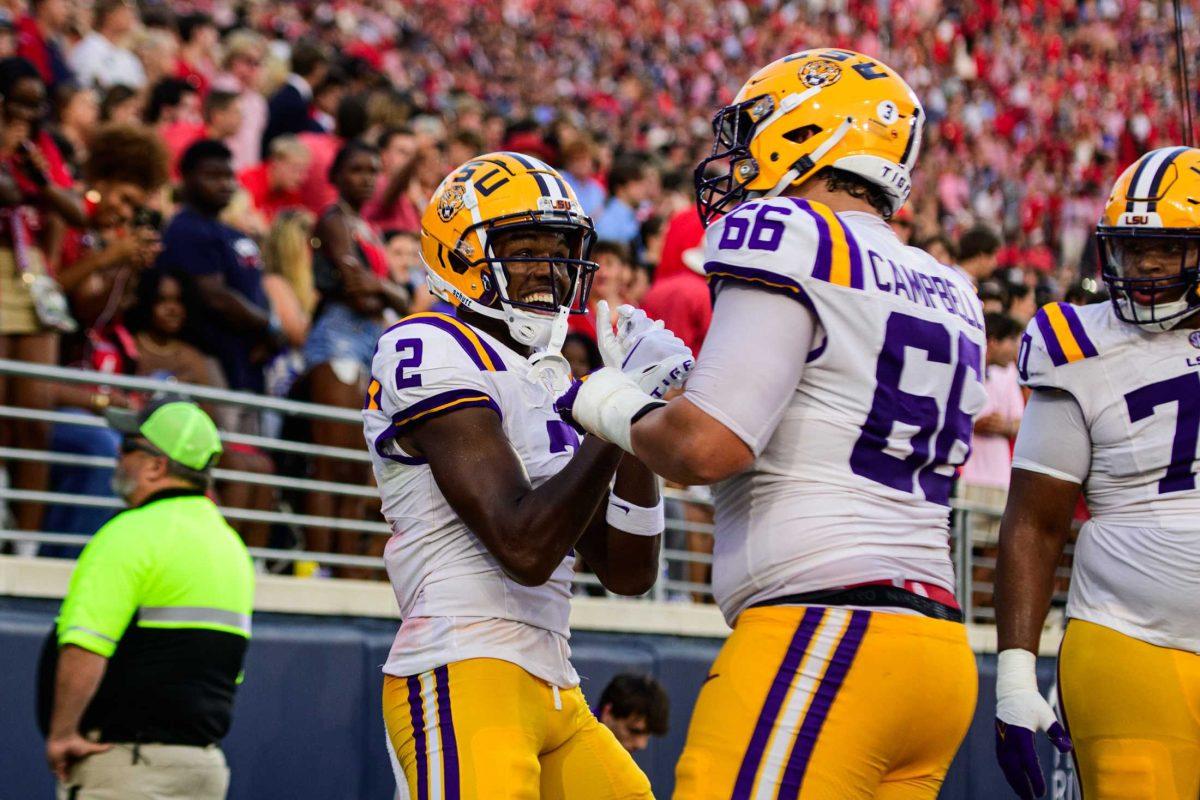The nation’s shrinking economic status probably would have gone unnoticed for Sarah Smith if it weren’t for her dad.
“It hasn’t affected me in a major way really,” the elementary education junior said while eating with two friends at the Mall of Louisiana Food Court. “But, my dad’s in the trucking business, and right now they just don’t have as much to ship.”
Smith’s friend Amy Johnson, a speech communication sophomore, has seen the recession first-hand.
“I worked in Victoria’s Secret in a mall in New Orleans over Christmas,” she said. “After Christmas, even with the sales, nobody was in the mall.”
As the two chatted, their other friend, construction management sophomore Chad Ramsey, admitted, “I didn’t really know it was such a big deal.”
Each of the students, like the University community, has a different understanding of America’s current economic state — recession.
A recession is a decline in economic activity that lasts for more than a few months.
“Normally, the economy is expanding and healthy, but occasionally, there is a slowdown,” said Dek Terrell, Freeport McMoran chair and director of the Division of Economic Development and Forecasting in the business college. “That downturn is what we call a recession.”
A recession begins after a period of increasing economy activity decreases and ends when activity increases again.
The National Bureau of Economic Research, a group of economists which determines business cycles, uses three economic indicators to determine recession: employment, manufacturing and trade sales volume and industrial production.
Using these indicators, the NBER determined the current recession began in March 2001 and may end by July 2002.
“Recessions, this one in particular, don’t usually last very long, and I don’t expect this one to be very severe,” Terrell said. “But, there are always individuals impacted.”
Several circumstances precipitated the recession.
Companies scaled back on technology spending last spring as the stock market fell. Companies also had less money to fund new equipment purchases or equipment improvements, and costs rose.
Then, the Sept. 11 attacks may have pushed what was a slight downturn into a full-blown recession, the NBER said.
The attacks strained the travel and tourism industries and further lowered consumer confidence nationwide.
The good news is Louisiana is weathering the recession better than most states, according to Terrell and Loren Scott, economics professor emeritus and local economist, respectively.
“There’s a saying – ‘When it hits the fan, it isn’t evenly distributed,’” Scott said.
The NBER lists employment as the single biggest factor in determining recession.
“Most states experienced lower employment last year, but more jobs were created in Louisiana,” Scott said. “This is great for people who want to stay in the state to work.”
One thousand seven hundred new jobs were created in Louisiana last year, but Louisiana’s unemployment rate was one of the worst in the nation, according to the U.S. Bureau of Labor Statistics’ latest figures.
Of Louisianans seeking employment in November 2001, 6.3 percent of them did not have jobs.
Scott said that although more jobs were created in Louisiana last year, the 2001 expansion was smaller than the 2000 expansion.
“There are a lot of things to consider, though,” said Terrell. “Louisiana consumer confidence is also really high.”
Scott said more Louisianans bought cars and houses in 2001, which is a good sign for the state.
The Federal Reserve Board lowered interest rates 10 times to 40-year lows last year to encourage borrowing for such big purchases.
Despite these efforts, the national real estate market is suffering.
In retail sales, Louisiana did not experience as heavy a blow as the rest of the nation.
“I don’t think there were less customers at the Mall [of Louisiana] because of recession,” said Ben Kasten, a computer engineering sophomore and mall carousel operator. “I saw less people here, but there has been a steady decline over the past three years.”
Kasten suggested that fewer customers came last year because the novelty of the mall was wearing off.
Several other mall employees also felt that the recession had little effect on sales.
Both Terrell and Scott said areas dependant on the technology industry suffered major blows.
“Places like Austin and Houston aren’t the best places to be now,” Terrell said. “Louisiana is taking great steps to get into the business, but it doesn’t have a large tech presence now.”
The fall of energy-trading goliath, Enron, is one of many technology collapses making waves across the nation in the past year.
Enron’s collapse is endangering other companies — including its former accounting firm Arthur Andersen — and its investors’ financial security.
“With Enron gone, and now Arthur Andersen in trouble, Houston is practically drying up,” said Angi Burns, a 1999 mass communication graduate and consultant in the city. “There’s just no work here.”
Other industries, especially tourism and travel, suffered after the Sept. 11 terrorist attacks, but in Louisiana those industries are faring rather well, Terrell said.
Large-scale tourist events like the Super Bowl and Mardi Gras also will help the state economy.
Terrell said the oil and gas industry, another of Louisiana’s main sources of income, also is growing.
“The restaurant industry was hit particularly hard here, though,” Scott said. “You see long-time establishments like Ralph and Kacoo’s and Mamacita’s closing because of a poor customer count. People are feeling the pinch.”
Toya Hagwood, a psychology senior and restaurant employee, agrees.
Hagwood has worked at Logan’s Roadhouse on Bluebonnet for two years and has noticed a definite decline in customers.
“At times I dread going to work because I know I’m not going to make any money,” she said. “Last night, for example, I worked four hours in a five-table section and only had five tables all night.”
Some industries are affected more than others, but recession eventually affects everyone, Scott said.
A proposed economic stimulus package will cut some taxes and take some money from federal programs if passed through Congress.
“Recession specifically affects students when they go out looking for a job,” Terrell said. “Graduates are getting lower salaries to start and about five percent won’t find a job.”
Though the picture seems bleak, Terrell and Scott said the news is not as bad as it appears. Both said the consensus among economists is that the recession will end in June or July.
“It’s a real gradual thing, and it’s not as severe as past recessions have been,” Terrell said. “We’re really talking about half-percent increases and decreases. The average student will find a job — he just won’t make as much money as he would have eight years ago.”
Surviving the slowdown, part 1
January 24, 2002





